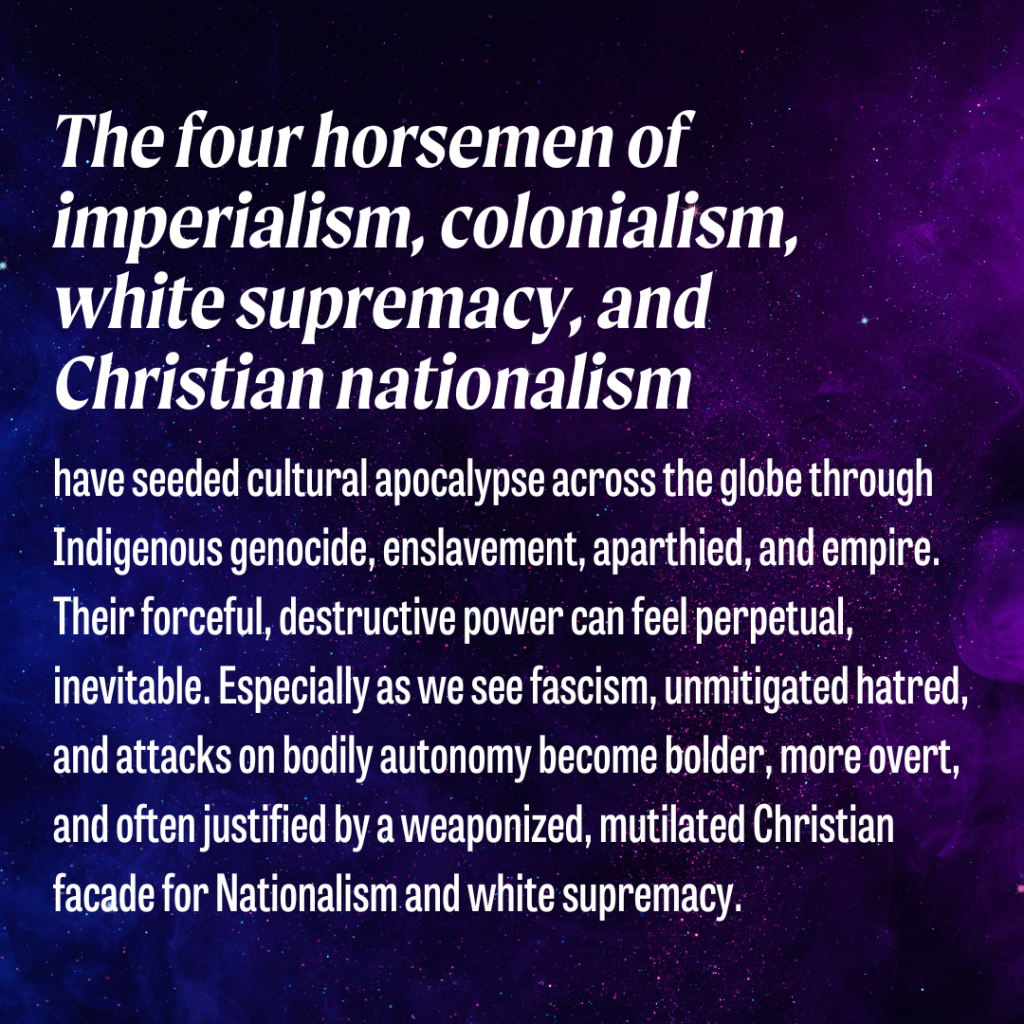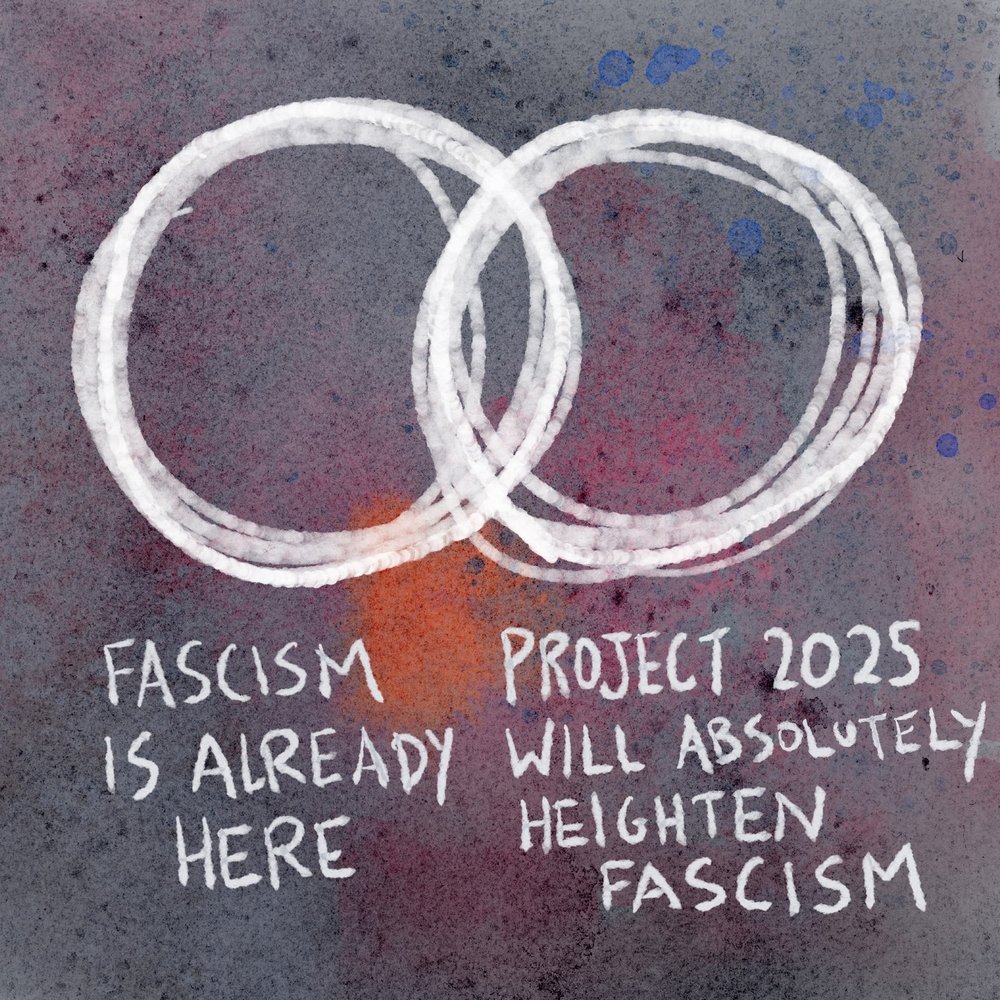Rev. Lyndsey Godwin
I’ve lost track of how long I’ve been bringing up apocalypse in “polite” conversation. Often when I bring it up, I watch discomfort and anxiety creep up on people’s faces. Many folks jump directly to the outcome of the U.S. presidential election, citing it as the moment of impending apocalypse. Folks name the fear of increased fascism on U.S. soil, the possibilities of violent power transitions, and potential impacts on democracy. They rightfully point to our recent history: January 6th, Charlottesville, Shelbyville, and increasing targeting, manipulative rhetoric. Behind those anxieties lie other dreads that may be harder to name: our social and political orders are shaken; the fractures in the systems that many of us were taught to believe in–capitalism, U.S. power and credibility–are becoming more obvious. Like the emperor without his clothes, we are starting to see that empire is also a pernicious farce. For many who have been tracing the impacts of Christian Nationalism and Christian Imperialism, we see a longer, wider apocalyptic trajectory with countless signposts along the way. This fall’s election is only one moment of reckoning in a galaxy-sized constellation of pivotal portals.
For much of my life, I believed that “things were getting better”. For me that meant that change was slowly happening in a generally more progressive direction. From my white, working-middle class lens, it seemed that racism, sexism, homophobia, and the structures that help hold these isms, were lessening, if maybe not as quickly as I hoped. But as Reproductive Justice, and other teachers, have taught me to interrogate the systems, institutions, and ideologies at play, more nuance has been revealed. These systems are not broken.They are working exactly as intended, appearing to improve in some aspects, from some angles, but the root-level violence morphs, and is manipulated, to continue serving the created purpose.
Our systems, founded in imperialism, colonialism, white supremacy, and Christian nationalism, are rooted in dehumanization, in codifying all of our world as individual “resources” to be used in service of those with power. This dehumanization requires hierarchy to determine which humans are worthy of potential access to power and which can be used, abused, and ignored as expendable commodities. It goes beyond dehumanization, framing the earth and its many splendors as ripe for domination, as resources to exploit for production of profit & ownership.

This orientation is inherently death-serving and destructive, devouring people and cultures. It is unsurprising that these systems have latched onto a conception of apocalypse as end-time armageddon. The four horsemen of imperialism, colonialism, white supremacy, and Christian nationalism have seeded cultural apocalypse across the globe through Indigenous genocide, enslavement, apartheid, and empire. Their forceful, destructive power can feel perpetual, inevitable. Especially as we see fascism, unmitigated hatred, and attacks on bodily autonomy become bolder, more overt, and often justified by a weaponized, mutilated Christian facade for Nationalism and white supremacy.
Catherine Keller, alongside many other scholars, Christian and otherwise, remind us that “The Greek term used in the New Testament, apokalypsis, does not signify ‘the end of the world.’ Not, time’s up, lights out. Close down the creation. On the contrary, it means not to close but to dis/close. To open what is otherwise shut” (Keller xvii). For many of us this moment feels so apocalyptic and transformative because the controlling of the four horsemen of imperialism, colonialism, white supremacy, and Christian nationalism is being revealed, made clear and undeniable.
The disclosure, the transparency of apocalypse in its original meaning, invites us to get honest about the state of the world and imagine, then practice, the transformation necessary to build God’s kin-dom. James Baldwin made it clear “nothing can be changed until it is faced.” Apocalypse across time has been an invitation to face honestly the impacts of dehumanization, domination, and systemic violence, and then actively participate in changing those systems and co-crafting new possibilities. Through this lens, apocalypse is filled with radical hope.
Keller calls on Jurgen Moltmann to give us another way to engage revelation. “That tradition of ‘eschatology’ misleadingly read as ‘doctrine of end things’, is about a hope that is ‘revolutionizing and transforming the present.’ Eschatos means not just ‘end’ but ‘edge.’ This is no soft hope but an edgy demand. The vision of social transformation” (Keller 8). In this vein, apocalypse is not the violence or the threat of final judgment. Apocalypse is the process of revealing as evil, the systems of brutalization that we have come to normalize and justify, as contradictory to honoring every human as wholly worthwhile, a reflection of divine possibility. THEN co-working with the Divine, and joining in a long, historic line of those who have and are working to co-create a world of mutuality, dignity, and justice for all of creation.
The apocalyptic violence, destruction, and oppression we are witnessing is neither justified nor God-ordained. Violence seethes across our globe: in Palestine, Israel, Lebanon, Sudan, Congo, Haiti, Ukraine, tens of thousands are killed, their deaths justified and bolstered by power-hungry empires & enterprises. Unprecedented destruction unfolds in hurricanes, fires, and floods, in ways and means we have long said were “impossible,” but have been made possible through climate change, the direct result of the corporate abuse and misuse of our earth and her vast resources.
Apocalypse is neither new nor singular. Stories of apocalypses survived are instructive in facing the brutal reality of imperialism, colonialism, white supremacy, and Christian nationalism. These stories point us to methods and practices for survival, and make explicit who we should follow for visionary leadership to steward new possibilities. At the center of the majority of these stories are Black, Indigenous and brown communities across the globe, trans folks, disabled folks, women.
Countless Indigenous leaders have been extolling us to center Native experiences. To understand that Indigenous communities on the American continents, and across the globe, have lived through and survived the apocalypses of settler colonialism, and are still fighting for their thriving and the flourishing of the planet.
Episcopal Theologian and member of the Choctaw Nation, Steven Charleston names this the “American Apocalypse” in his book We Survived the End of the World: Lessons from Native America on Apocalypse and Hope. He writes
On Turtle Island, the name many Indigenous nations give to North America, the apocalypse began its inexorable consuming of our Indigenous way of life from the moment European settlers reached our shores. Our people died from a host of diseases for which they had no immunity or cure. The Mayflower was a plague ship…At the same time European colonialism, with its rapacious hunger for our land, brought war and destruction upon us no matter how many peace treaties we signed. Whatever we gave, it was never enough. Many of us were forced onto death marches, like the Trail of Tears, that claimed the lives of thousands of people, especially our elders and infants.
Over time, our children were taken from us. They were taken to boarding schools where they suffered physical and sexual abuse. They were forbidden to speak their language or wear their cultural styles of hair or clothing. The animals on which we relied for food were systematically slaughtered and left to rot. Racism made us objects of derision and scapegoating. Even our ways of prayer and worship were outlawed. We were left in poverty and isolation, with the expectation that our genocide would soon be complete….But they did not all die. They did not become victims of genocide. They did not disappear. They survived (Charleston 6-7).
There is a parallel and related story that could be told about the enslavement of millions of people from the African continent, and the ways that anti-blackness continued, continues through Jim Crow and systemic racism across the Americas.
Apocalypse pulls back, reveals the harm in these systems that we have been trained to understand as inevitable, “natural,” even “god-ordained.” These are death-dealing systems that teach us to disconnect and disassociate in order to ignore the violent toll and keep pushing through. If the bubble of disassociation is broken, we can see and face the frenzied violence.
Through these stories and across the globe, thousands, millions of folks are calling for a new world. For communities that are practicing new ways of being that do not rely on violence, oppression, domination, empire: Land Back; Reparations; Free Palestine, Congo, Sudan, and Haiti. Communities crafting a world that centers dignity and bodily autonomy for all humans and mutual relationality for our planet.
Prophetic voices, organizers, and communities reveal cracks in the disconnected veneer of this violent “normal” and demonstrate that something radically different is possible: community-led responses that center well-being, dignity, bodily autonomy, for ALL our people and our earth.
In the responses to Hurricanes Helene and Milton, we see the creative, generous, and immediate power of community-led mutual aid, skill sharing, and resource sharing, and we are invited to join in.
The Stop Cop City movements demand that we invest in the things that provide safety and security for our communities: housing, healthcare, transportation, and education, rather than investing billions in a militarized police force.
Mass organizing for a Free Palestine demands that we recognize the humanity of Palestinian people, that we face the ways that occupation and empire can be justified and shielded by faith, and that we learn the role of Christian Zionism as a political and military force, intent on using, abusing, and destroying both Jewish and Muslim communities.
There are so many places to look for invitations into apocalyptic revelation and action: Reproductive Justice, the Movement for Black Lives, Stand with Standing Rock, and Disability Justice organizing are a few more places to start.
Still, finding our way through apocalypse can be overwhelming. There is so much upheaval, so much transformational possibility, oftentimes defined by conflicting and diverging understandings. It can be hard to focus and hard to find your bearings. This makes many of us hesitant to act.
One of the most crucial skills to develop during apocalyptic times is the ability to hold onto contradictions and multiple truths, to wade through complexity with nuance, holding onto both personal and relational integrity. This is a time to practice imperfection and accountability, politically and relationally. Facing apocalypse means recognizing that we must continue to navigate our way through the harmful, dysfunctional systems that are our current reality, while holding onto and working toward the future possibilities.

Which circles us back around to where most folks land when I bring up apocalypse: the U.S. Presidential election, a moment in our apocalyptic galaxy. Vent Diagrams, a collaborative social media and art project started by educator E.M./Elana Eisen-Markowitz and artist Rachel Schragis, recently posted several Vent Diagrams that illustrate some of the contradictions alive in this political season for progressive folks. There are so many reasoned, politically-informed, and contradictory approaches to presidential voting this season. And there is likely some truth in all of them. The candidates, the two-party system, the electoral college, the concept of a “single issue voter” are all messy and imperfect, yet they are the realities we are faced with at this moment.
At SACReD, we don’t have the solution for navigating this presidential election, and we urge you to turn to other trusted political sources to consider the most ethically aligned, imperfect way through for you. Imperfect decision making in complex times, is a good apocalyptic practice.
But we are going to ask you to vote. Especially “down-ballot”, in your state and local elections. State and local elections have a direct and dramatic impact on our material lives. We can determine the governors and congress people who represent us. Are they working for a world where Reproductive Justice is a lived reality? How about our city council and school board members?
Across the country we have opportunities to build communities more aligned with Reproductive Justice with our votes. Our votes shape our communities: access to healthcare, including reproductive and gender-affirming care, immigration policies, infrastructure, school curriculum and policies, gun-safety, family and child benefits, budgeting and how our taxes are spent, and more. There are state-wide abortion-related votes on the ballots of 11 states.
We ask you to vote in the midst of the contradictions as an apocalyptic practice. We ask you to vote for yourself and your neighbors.
- What votes will support the survival of the most folks in these apocalyptic times?
- What will your transformational, voting-in-apocalyptic-times plan look like?
- What will you do beyond voting to continue to face apocalypse and steward transformation? Who is the community you are doing it with?
May this be a time of transformation.
May we craft new ways to be together.
May we be open to possibility.
May we seek to partner together and partner with the Divine in building a world that honors all of Creation.
May it be so.
Citations
Charleston, Steven. 2023. We Survived the End of the World: Lessons from Native America on Apocalypse and Hope. Minneapolis: Broadleaf Books.
Keller, Catherine. 2021. Facing Apocalypse: Climate, Democracy, and Other Last Chances. Maryknoll, NY: Orbis.
2024. N.p.: Ballotpedia. https://ballotpedia.org/2023_and_2024_abortion-related_ballot_measures.
